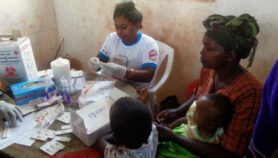By: Nicky Lewis
Send to a friend
The details you provide on this page will not be used to send unsolicited email, and will not be sold to a 3rd party. See privacy policy.
South Africa’s Treatment Action Campaign (TAC) has defied the country’s patent laws — and the stance of its government — by bringing generic versions of widely-used anti-HIV drugs into the country from Brazil.
Although the drugs in question are currently manufactured in South Africa in their proprietary form, these cost twice as much as generic versions, making them prohibitively expensive for most HIV/AIDS patients. The Brazilian drugs cost just US$1.55 per patient per day.
By deliberately infringing patent laws, the campaigners say they are challenging the South African government to allow the generic production of HIV drugs in the country. For example, they argue, the government could issue compulsory licences that by-pass the authorisation to manufacture drugs that is normally required from patent holders.
“The South African government should pursue compulsory licensing to ensure that generic antiretrovirals can be produced and/or imported in South Africa,” says Zackie Achmat, chair of TAC.
The TAC delegates — accompanied by a representative from the Congress of South African Trade Unions — went to Brazil to study the success of its HIV treatment programme. AIDS-related mortality has more than halved in Brazil since the Brazilian government started giving free access to antiretroviral therapy in 1996.
The drugs are the second shipment to supply a Médecins Sans Frontières (MSF) HIV treatment project in Khayelitsha, a township outside Cape Town. More than 50 people, including one of the TAC delegates, Matthew Damane, are already taking the generic Brazilian medicines.
“I have personally benefited from the MSF antiretroviral programme,” said Damane, “and I have gone to Brazil to bring back generics so that more people like me can have access to these medicines”.
© SciDev.Net 2002
Related external links:
Treatment Action Campaign
Médecins Sans Frontières
More on Intellectual property
News
Local software can spur development, says UN report
[ADDIS ABABA] Local software production and development can spur economic growth in Africa and other ...08/01/13
News
Tree intercropping ‘could save Africa’s soils’
[NAIROBI] Scientists have reported in Nature that the20/11/12
News
Africa ‘needs to do more to boost innovation’
[ABIDJAN, COTE D'IVOIRE] The European Union and31/05/12
News
Botswana to develop policy to protect traditional knowledge
[CAPE TOWN] Botswana is developing a policy to protect, preserve and promote its indigenous knowledge ...24/08/11
News
Presidential award for Ugandan research stirs up debate
[KAMPALA] A Ugandan scientist trying to use the soapberry plant to fight mosquitoes has received US$4 ...29/06/11
Feature
Turning plants into pills in Kenya
Traditional healers are joining forces with plant chemists in Kenya to d ...13/12/07






